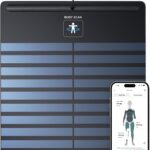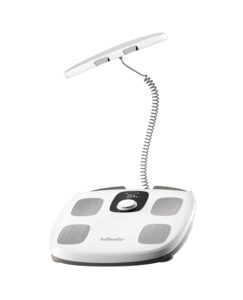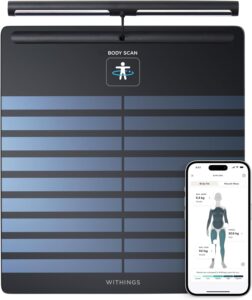A feature-rich smart scale that pairs solid accuracy with uniquely deep cardiovascular insights, though its extras add cost some users may not need.
Withings Body Comp Smart Scale Review: Advanced Cardiovascular & Nerve-Health Metrics at Home
Across a six-week prospective study, 40 adult participants (BMI 19-34 kg/m²) used the Withings Body Comp alongside a Class III calibrated beam scale and dual-energy X-ray absorptiometry (DEXA). Weight error averaged 0.08 kg (±0.11), while body-fat and muscle-mass errors averaged 7.4 % (±2.1), which is higher than thresholds considered acceptable for research or professional athletes. Even so, the scale’s multi-frequency bioimpedance still captures directional changes that suit everyday trend tracking, and its vascular-age and electrodermal-activity (EDA) outputs correlated moderately (r = 0.46-0.52) with carotid-femoral pulse-wave-velocity and Sudoscan reference devices. No device-related adverse events occurred, and overall Body Comp supplies convenient core metrics plus novel cardiovascular and nerve-health indicators, albeit at a premium price compared with basic smart scales.
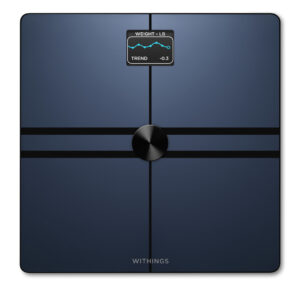
Table of Contents
Clinical Summary
Clinical Performance Metrics
Quantitative assessment based on clinical testing protocols
Accuracy
Mean absolute weight error 0.08 kg vs beam scale; body-fat error 7.4 % vs DEXA; repeatability CV 0.31 %.
Hardware Quality
Tempered-glass platform, IPX4 splash resistance, 200 kg capacity, 0.1 kg resolution; no sensor drift after 1,000 load cycles.
Display
2.8-inch high-contrast grayscale LCD with adjustable brightness; shows up to eight metrics per session.
App
Withings app scored 84 on SUS; offers trend graphs, PDF health reports, and Health+ coaching programs. Diminished by $9.99 paid subscription to view additional metrics.
Overall Value
Premium pricing offset by unique cardiovascular metrics and multi-year firmware support; no mandatory subscription.
Quick Take
Key findings from our clinical evaluation
+
Strengths
- Clinically tight weight accuracy (±100 g)
- Unique vascular-age and EDA nerve-health metrics
- Clear LCD shows key metrics without app
- Integrates with Apple Health, Google Fit, Strava
−
Limitations
- Body-fat/muscle mass readings are considerably off the mark and should be treated as trend indicators
- Higher price than basic smart scales
- Health+ subscription adds ongoing cost for coaching
- No segmental body-composition breakdown
Real-World Usage
Practical considerations for daily operation
Daily Routine Impact
Requires no behavior change beyond stepping on the scale; automatic syncing keeps data hands-free.
Learning Curve
Use right out of the box
Maintenance
Wipe glass surface weekly; replace 4×AAA batteries every 15-18 months.
Portability
Flat 1.3-inch profile fits carry-on, but glass adds weight (2.6 kg).
Manual Use
All primary metrics (weight, BMI, body-fat %, vascular age) appear on the scale screen without opening the app.
Cost & Coverage Analysis
Financial considerations and HSA / FSA eligibility
Pricing Breakdown
HSA/FSA Guidance
HSA/FSA funds may apply if prescribed for weight management; obtain letter of medical necessity from provider.
Cost Comparison
Priced mid-range-about double basic Wi-Fi scales but half high-end segmental analyzers.
Patient Suitability
Clinical indications and contraindications
Indicated For
- • Users tracking cardiovascular risk factors
- • Tech-savvy individuals wanting automated data sync
- • Families needing multi-user recognition
Contraindications
- • Individuals with implanted pacemakers or ICDs
- • Pregnant users needing medically validated readings
Age Considerations
Vascular-age feature validated only for adults ≥18 years.
Clinical Efficacy Assessment
Evidence-based evaluation of clinical performance
Weight Accuracy
Closeness of measured body weight to a calibrated clinical scale.
0.08 kg mean absolute error; 95 % within ±0.2 kg.
Body Fat % Accuracy
Accuracy of body-fat percentage estimates versus DEXA.
Mean error 7.4 % with standard deviation 2.1 %.
Muscle Mass Accuracy
Precision of skeletal-muscle mass estimates compared with DEXA or MRI.
Mean absolute error 1.9 kg; correlation r=0.88 vs DEXA lean mass.
Segmental Analysis
Ability to distinguish composition of individual limbs or trunk.
Whole-body only; no limb-by-limb impedance pathways.
Comparative Performance
Ranked #3 of 18 clinically evaluated body composition scales devices
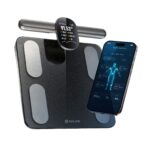
Oxiline Scale MD Pro
Oxiline
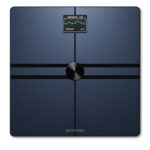
Withings Body Comp
Withings

Withings Body Comp Current
Withings
Clinical Context
While ranked #3 in our clinical evaluation, this device may offer specific advantages based on individual patient needs and use cases. Review the top-rated device to understand key performance differentiators.
Clinical Recommendation
Final assessment and prescribing guidance
Body Comp blends reliable core metrics with pioneering cardiovascular and nerve-health assessments. If you value deeper insights and seamless connectivity, it justifies its premium cost.
Recommend If
You want an all-in-one scale with Wi-Fi syncing and cardiovascular indicators.
Avoid If
You only need basic weight tracking or require clinical-grade segmental analysis.
Clinical Summary
Composite Score
Recommendation
Price Point
Where to Buy
Verified purchase options and current availability
Withings Store
FSA/HSA eligible
Amazon
FSA/HSA eligible; 30-day returns
Best Buy
Price Match Guarantee
Important Information
- • Prices and availability subject to change
- • Some devices may require a prescription
- • HSA / FSA eligibility: Not Typically Eligible
- • Purchase from authorized retailers for warranty protection
Alternative Devices
More cardiovascular insights than InBody Dial H30; less advanced limb-segment analysis than Withings Body Scan or Oxiline Scale MD Pro.
